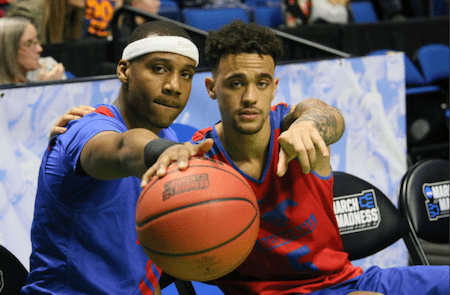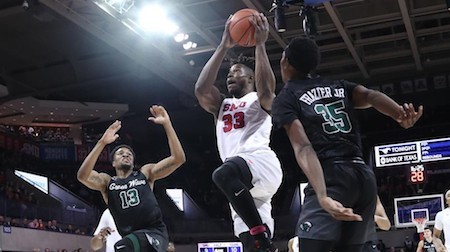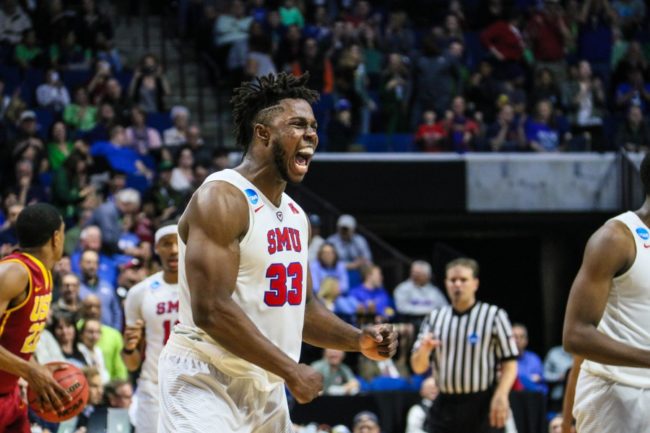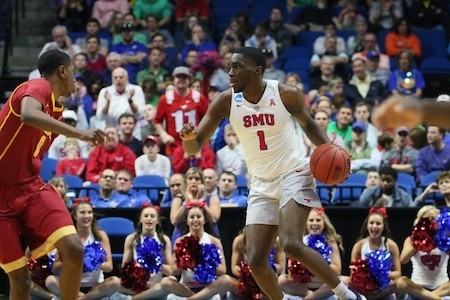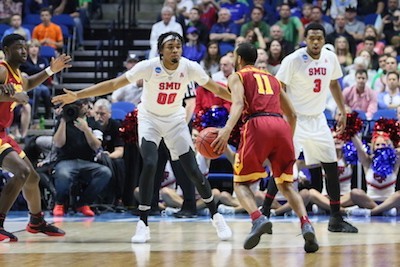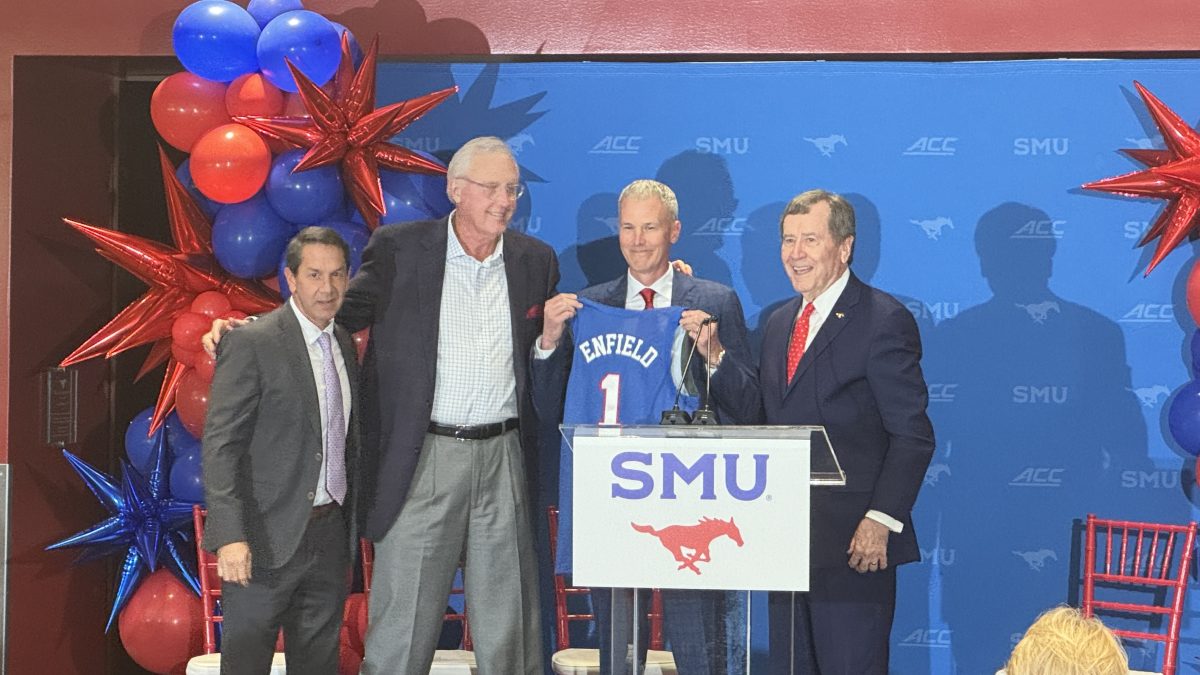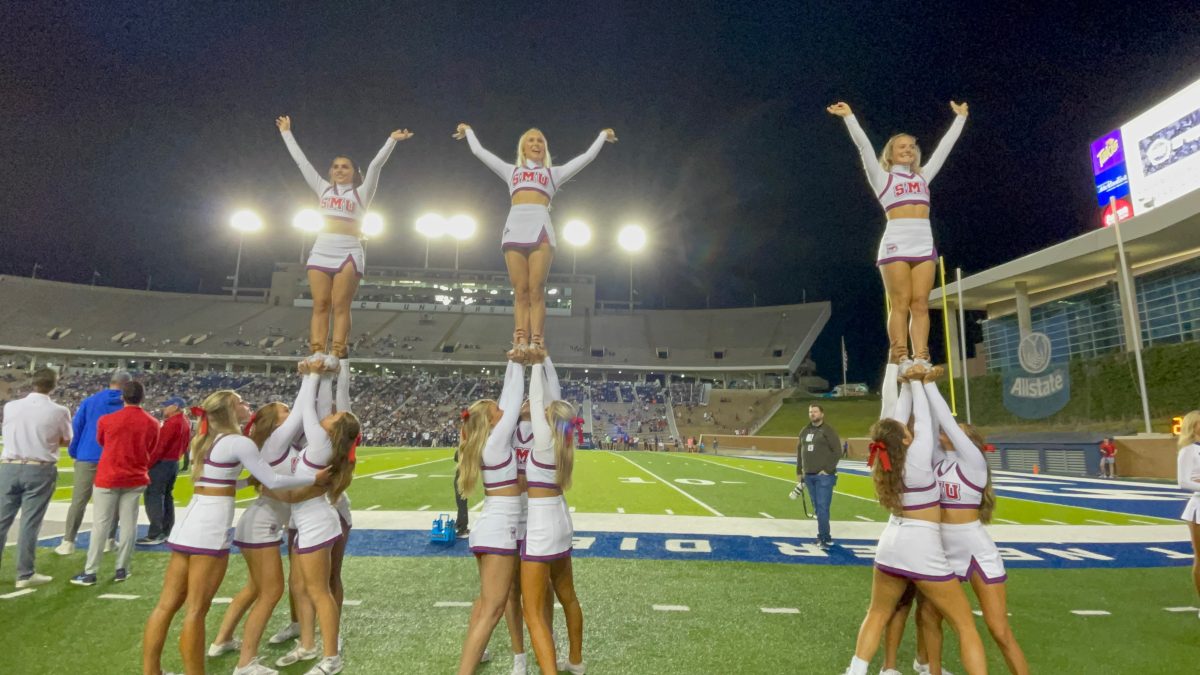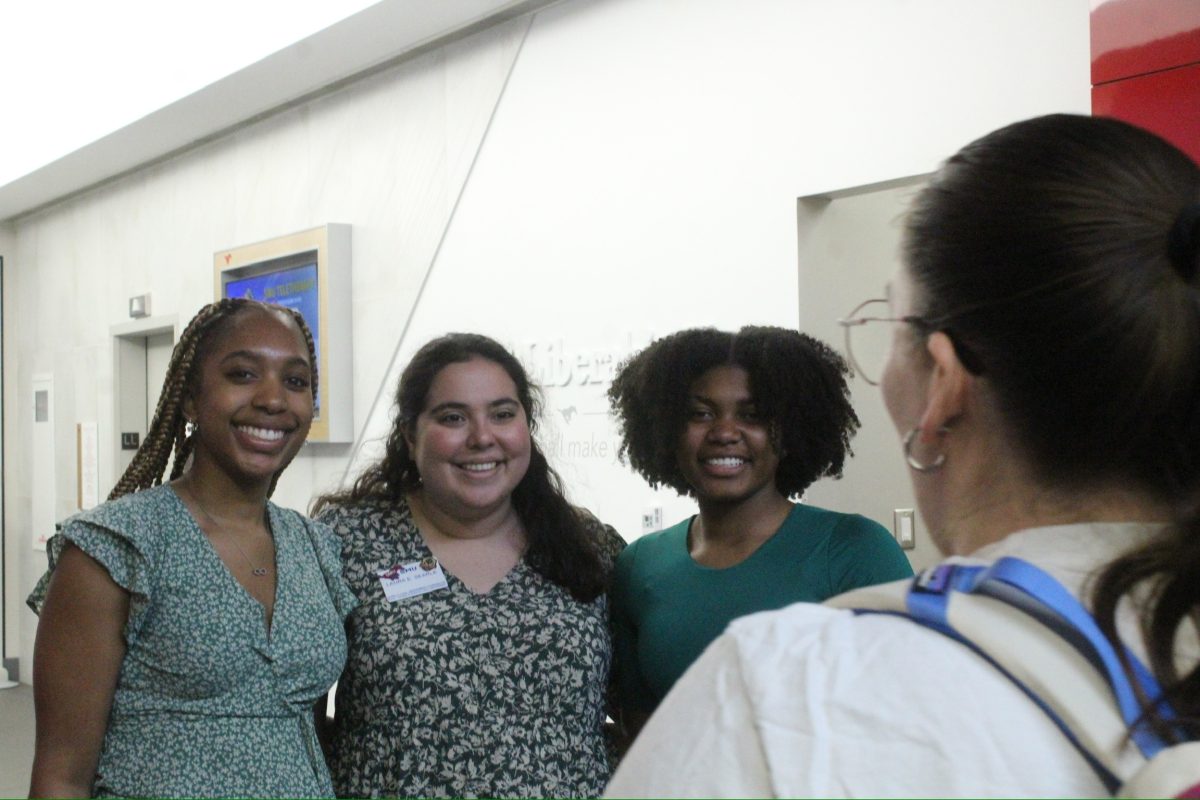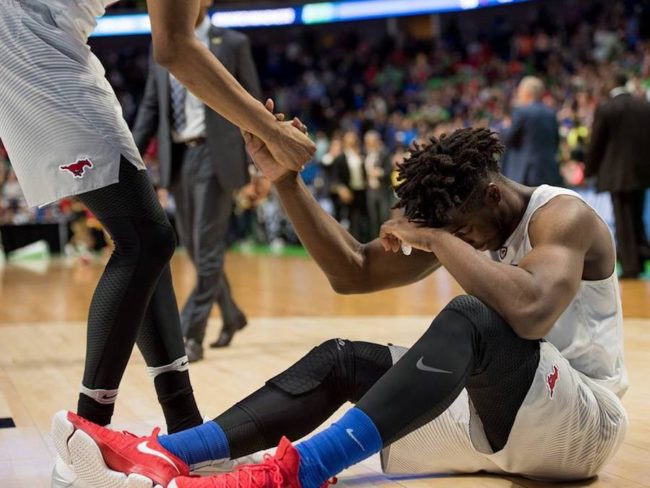
TULSA, Okla. – The 3-pointer was hardly a surprise. The player who made it is one who is expected to take, and make, a shot of such magnitude. The coaching staff that called the defense on the play expected the player to be open.
Elijah Stewart, a 38 percent 3-point shooter, was open in the defense’s left corner. He already had 19 points and five 3-pointers. He is the team leader in made 3-pointers.
SMU’s defense was set up to leave him there. Standing outside SMU’s locker room, Tim Jankovich explained the strategy, simultaneously drawing it out on a borrowed notepad.
His drawings may as well be Sanskrit. But his explanation was clear. With Ben Moore at four fouls, SMU wanted to give him some help. When USC ran a pick-and-roll, Sterling Brown came from the corner to help on Chimezie Metu as he rolled toward the basket, allowing Moore to play up near the passer. That prevented Metu from getting a pass from USC point guard Jordan McLaughlin, which was the goal.
Brown coming to play Metu’s roll left Stewart open. The surprise, though, was that McLaughlin recognized it immediately. Before SMU could rotate Jarrey Foster to cover Stewart, McLaughlin zipped a pass over Moore to Stewart.
“Well, we know that the way they give early help,” USC head coach Andy Enfield said. “They’re one of the best defensive teams in the country, but they had to give up something, so we thought the corner three would be there, and it was.”
Stewart had taken the same shot several times before in the game. Though he had made five 3s, he had missed seven, including a wide-open one from the same corner earlier.
USC also ran the same play on the previous possession. Stewart was open. The result: a McLaughlin turnover.
This time, Stewart caught it, released it, and made the shot – his sixth 3 of the game. USC went back in front, this time for good, 66-65.
“I just let muscle memory take place,” Stewart said.
The free throw came after the second-winningest player in SMU history suddenly changed direction and pursued an offensive rebound.
Sterling Brown jab-stepped on the wing, then put the ball on the floor. He took two dribbles, then lofted a jumper about two feet inside the free throw line as two USC defenders rotated down on him. It hit off the heel of the rim, and started to careen downward.
Ben Moore ran along the baseline to get in position for the rebound. Step for step with him was Stewart. As Moore tried to get position, Stewart sealed him off and stayed in front as both ran – or more accurately, shuffle-stepped – under the basket. Moore, looking like a wide receiver trying to shed tight coverage, changed direction and moved toward the rim. He used a legal, but slight, arm extension that separated his arm from Stewart’s arm. Stewart kept moving sideways for another step. As Moore went up to grab the rebound, Jonah Matthews ran into Moore while he was in mid-air.
To the line Moore went, with 14 seconds left. USC was not over the foul limit, so Moore, a 63 percent foul shooter, had a one-and-one. Make the first, it’s a tie game and a chance to give SMU the lead with another free throw.
Moore took his post at the foul line, but stepped off the line a few seconds later. The officials were going to review something. Stewart’s 3, specifically.
Jankovich asked the refs to review it. He and the rest of the SMU bench thought it was close enough to look at again.
Moore needed to wait another minute to shoot the pressure-filled free throw.
“We were debating, do we tell them to go review it knowing that that puts Ben up on the line a little bit longer? That’s always a tough situation,” Jankovich said.
“And yet I would hate to have gone to the end of the game and said, geez, you guys should have reviewed. It was a two. That was a fairly big point, one single point.”
The review lasted about 40 seconds. It brought confirmation that Stewart’s right foot was, in fact, behind the 3-point line.
Moore went to the foul line again. His first shot hit the back rim, rolled along the rim, then spun out.
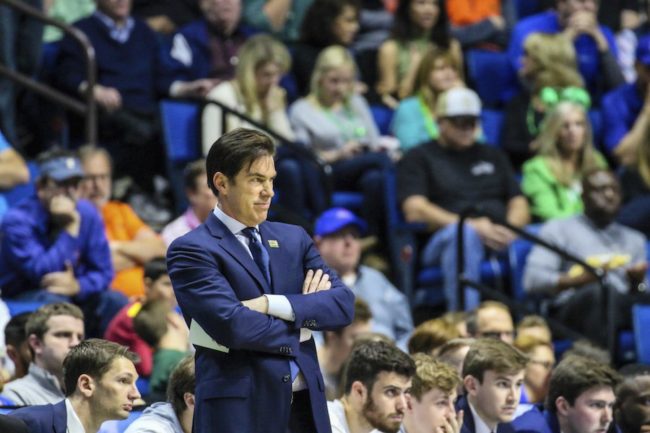
The timeout decision on SMU’s final possession wasn’t really a decision.
Yet it is the detail of the final possession that got the attention, rather than the possession itself.
Metu rebounded Moore’s missed free throw. Jarrey Foster fouled him immediately. USC was still in the one-and-one situation. Metu, a 72 percent shooter at the line, had made all eight of his free throw attempts to that point. His first attempt hit the back rim, and landed in the waiting arms of Semi Ojeleye. It kept the clock running. SMU had 13 seconds to score.
Tim Jankovich had three timeouts at his disposal. He did not call one.
He didn’t go back and forth in his mind, debating whether to call one or not. He has a philosophy on how handle these scenarios, one that he has developed in his 34 years of coaching.
Keeping his timeouts was not a rash decision made in the heat of the moment.
Jankovich knew he would be asked about it.
“You have to have a philosophy on that, you know, and here’s mine: Like good coaches, when you call timeout, now you never know what you’re going to get (from the opponent’s defense),” Jankovich said.
“When you let flow happen and you’re right in front of you and your team knows what you’re calling, it seems to me that it’s a bad idea. We know what we’re running, and so we know what they’re running. We know what defense they’re in and we know how they’ve been playing it. So what we call is going to make sense against what they’re guarding.”
USC spent nearly the entire second half in zone defense. Jankovich called a play that he thought would work against zone. Metu’s missed free throw is the flow of the game he described. SMU didn’t need to inbound, because Ojeleye rebounded it. SMU could call its play knowing exactly what defense USC would use. USC couldn’t discuss it.
“Now, does it always go in? Of course not,” Jankovich said. “I just think if you have the ability to communicate your team without a timeout late in the game, I think it’s 10 to 1 you have a better chance,” Jankovich said.
He felt he could communicate with them. So as his players ran up the court one final time, he called out a play to them.
“It’s a multiple, it’s an action that has four of five options,” Jankovich said. “We just didn’t execute it well. We knew what we were supposed to do.”
Shake Milton brought the ball up the court to the right wing, then handed it off to Brown, who dripped toward the top of the key. McLaughlin met Brown about five feet from the 3-point line. Brown stopped, then passed back to Milton on the wing.
Milton had just over three seconds to get a shot up. He split two defenders and darted for the lane. Bennie Boatwright’s 6-foot-10 frame trailed him, and Metu waited just inside the restricted arc. Milton stopped before Metu, but out of Boatwright’s range, and lifted a floater.
It hit the front rim, bounced down, hit off Moore’s arm and rolled away toward the sideline, all alone.
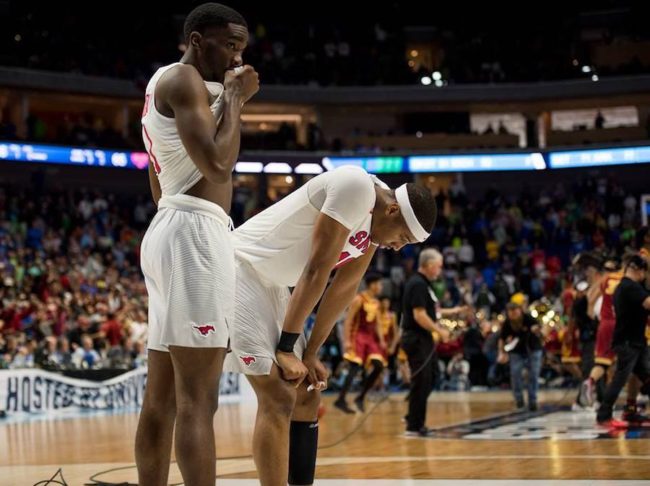
The devastation grabbed attention in the arena, even as USC’s bench poured out onto the court. Players mobbed each other and jumped into each other.
Meanwhile, Shake Milton couldn’t move. He looked physically incapable of motion.
He stood, frozen, inside the restricted arc, under the basket where his floater fell just short.
He couldn’t bring himself to move off the court. SMU players, coaches and even USC assistant coach Tony Bland came over to console him and give him a pat on the back, before he finally trudged off the court.
Semi Ojeleye sat along the baseline, a few feet from Milton, head buried in his hands again. He’d dropped to the floor right as the sound of the buzzer erupted over the din of the crowd, taking SMU’s last hopes of a win with it. After a minute, he willed himself up and into the tunnel to the locker room.
A placard for Brown initially sat on the dais where SMU held its press conference. Shortly after it was placed there, it was removed. Brown would not come to the presser. Instead, he stayed in the locker room. He was out of sight before the media crowd entered.
Just like a day earlier, a hoard of cameras and reporters surrounded Milton. The favorite topic of conversation was his chance to play an NCAA Tournament game in his hometown. As the same posse returned, Milton sat at his locker, towel around his head. He moved the towel to his shoulders, faced the cameras and answered questions, succinctly but politely.
Around him, teammates sat in chairs or in their lockers, staring into space. There was little discussion among them.
Milton reflected on the miss.
“I feel like maybe I could have gotten maybe more lift on it,” Milton said.
He dished on his feelings.
“Definitely disappointed. I feel like we could have made a deep run. Sometimes that’s just how it goes.”
At the same dais after the game, Moore was asked about the missed free throw. He lifted his head, his eyes red, and leaned into the microphone. Next to him, Ojeleye sat with his hands over his face, tears still on it.
“Right now I got a big knot in my throat that I’m trying to ignore it,” Moore said. “And I let a lot of people down in the locker room that I didn’t want to with missing that free throw.”
Ojeleye fielded a question right after. He moved his hands, sighed, paused, then answered. Jankovich interjected, wanting to opine on Moore’s previous answer.
“I’d like to chime in, because Ben doesn’t have any more games, and it kills me,” he said.
His final sentence to the lengthy comment:
“What I care about is that he doesn’t think for one second that he let anybody down,” Jankovich said. “If anything, he built a whole lot of people up for his entire career.”
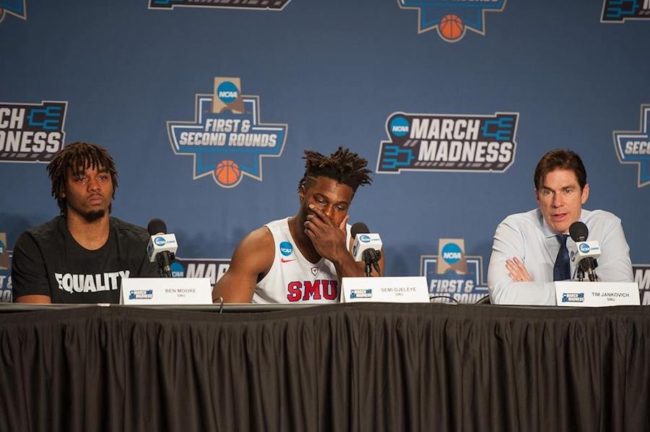
The reality is, that while the last 36 seconds are the memorable part of the game, SMU didn’t lose it all then. SMU trailed for 73 seconds in the entire game. But it’s deeper than that. SMU’s months of winning – its 16-game win streak and 26-1 record since Dec. 1, didn’t all of a sudden come to an end solely because of the events of the final 36 seconds.
“You talk about it all year, the little things are what will send you home in March,” Ojeleye said. “And today was a couple of possessions that really hurt us late, a few box-outs here, a few communications on defense.”
“We try to work on those things all year, and you harp about it, but when the moment comes, we have to execute, and we didn’t do that today.”
The Mustangs shot 38.5 percent in the second half and surrendered a nine-point lead. They struggled against USC’s zone, a type of defense they usually handle well. They had practiced zone offense since October, in preparation for their second game of the season against Eastern Michigan, which runs a Syracuse-style 2-3 zone.
There are going to be parts of games, and entire games, where execution isn’t at its peak. SMU has seen very few of those since November, when its record was 4-3. The second half vs. USC is certainly one.
“It happened at the worst time,” Moore said.
Moore sat at his locker after the game, beginning to grasp that he had walked off the court in an SMU uniform for the final time. He took a minute to reflect on his career. Right before SMU’s locker room was closing to media, he offered some perspective for himself and Brown.
“We felt like we changed the program around from where it was,” Moore said. “I’m proud of that, even if there’s no tournament win.”








